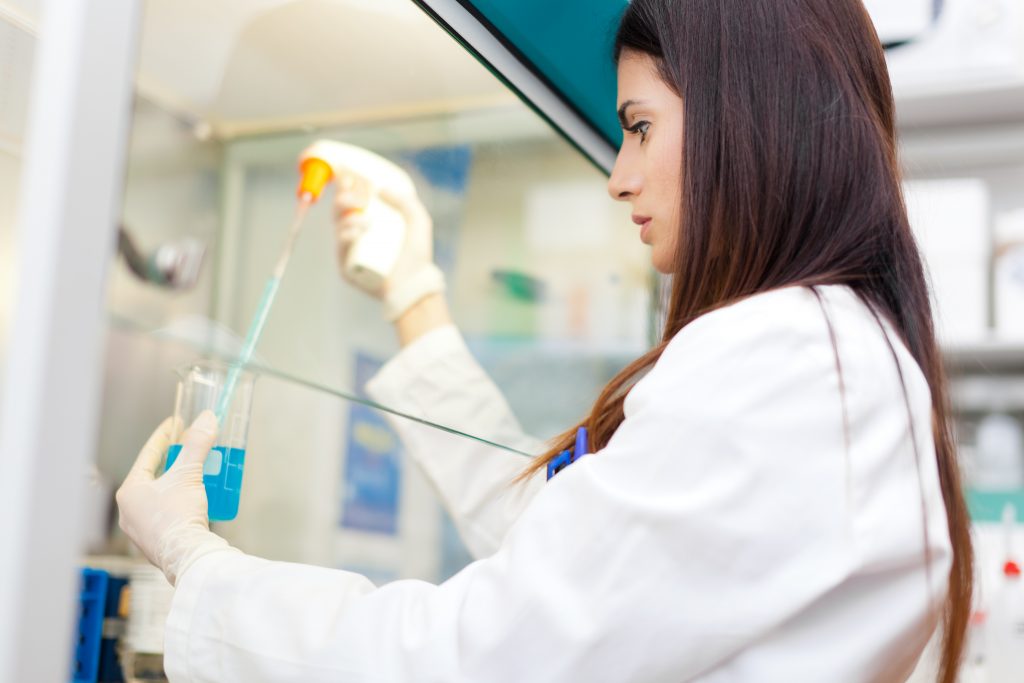
What is an analytical chemist?
An analytical chemist is responsible for carrying out analysis on the chemical structures of samples, with the aim of understanding how a substance behaves under different conditions. There are a number of areas analytical chemists can work choose to work within, such as quality control, drug discovery and development, and toxicology.
Job description
The specific duties of an analytical chemist can vary depending on the industry in which they work, but as a general rule they will be required to:
- Analyse raw materials and substances using a range of analytical instrumentation and techniques such as high-performance liquid chromatography (HPLC), gas chromatography (GC) and electrochromatography.
- Provide analytical troubleshooting support to others.
- Assist in ensuring compliance with strict quality, regulatory and company standards as well as work within a cGMP environment.
- Record data and interpret findings to produce scientific reports of results, making sure that everything complies with guidelines.
- Liaise with external stakeholders including customers and suppliers.
Types of employers
Analytical chemists are required to work across a range of scientific industries, such as pharmaceuticals, biotechnology and food production. They are extremely important to maintaining safety standards of materials and investigating any potential issues with substances.
You could look for the jobs with the following types of employers:
- Drug discovery companies and drug manufacturers
- Food and ingredients manufacturers
- R&D companies
- Hospitals
- University research departments
- Chemical manufacturers
- Environmental agencies
To find out who’s hiring right now, you can search our analytical chemist vacancies here.
Qualifications and experience required
Employers will require candidates to have an undergraduate degree (typically at a 2:1 or higher) to become an analytical chemist. The degree should be in a relevant subject such as chemistry, biochemistry, applied chemistry or analytical chemistry.
Whilst prior experience may not be required for entry-level positions, competition for jobs with big companies is extremely high, therefore practical work experience within a laboratory environment may prove to be beneficial. This can be attained through industry placements at university or undertaking summer projects with smaller companies. Full training is usually given on the job.
You may also find it beneficial to have a postgraduate qualification if you are looking to progress into a research-based career in the long term. This can help you develop your skills and show your interest in the field.
You can find CV and cover letter templates to download here.
How to become an analytical chemist
There are a number of skills required to be an analytical chemist:
- Familiarity with HPLC and GC
- Observational and analytical skills, as well as problem-solving skills
- Ability to work independently and confidently as well as part of a team
- Organisational and time management skills
- Technical abilities to work with complex equipment
- Excellent communication skills, both written and verbal, and the ability to present findings to large groups of people
- Ability to use initiative
In terms of interviewing for an analytical chemist job, you are likely to be asked questions that explore your problem-solving abilities and show examples of when you have been able to put these into practice during a project. An employer may also want to know about your competency with some of the technical equipment and regulations you are likely to use or work under in the role by asking scenario-based questions, such as “what would be the optimum HPLC conditions for analysing a compound?” or “describe a time where you used a specific analytical technique in a laboratory”.
Depending on what type of company you are aiming to work for, there are a variety of ways to search for analytical chemist jobs. University and hospital websites are a great place to start, as well as scientific job sites such as New Scientist Jobs. Specialist recruitment agencies such as CK Science are another very effective way to search for and land pharmacologist jobs, as they are able to offer tailored advice and support as well as speak to employers directly.
Sign up to CK+ to apply for roles at the click of a button and receive job alerts straight to your inbox here.
Salary expectations
For a graduate job, salaries may be in the region of £20,000 and can sometimes be more or less depending on the location and type of company. With some experience, this is likely to rise to between £25,000 and £30,000 before progressing higher with extensive responsibilities.
Other science careers you might want to consider
- Research Assistant – an entry-level role that requires individuals to help plan and conduct experiments alongside scientists, collect and log data and produce findings for researchers to present reports.
- Laboratory Technician – primary role is to support complex scientific investigations by carrying out routine laboratory-based technical tasks and experiments, such as sampling, testing and recording results.
- Biotechnologist – a role that uses molecular biology to understand and manipulate the genetic, chemical and physical components of living organisms in order to design products and processes that enhance the quality of human life.
Search analytical chemist roles
Visit the Advice Centre for job hunting, interview, CV and workplace tips





